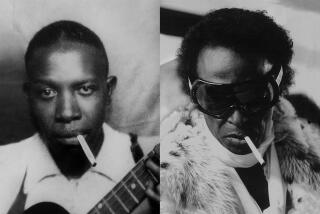CULTURE : Italian Government Funds U.S. Arts Center
- Share via
In an era when cultural activities are being sacrificed to balance budgets, Italy is creating the largest cultural establishment on the West Coast, a new center in Westwood designed to convey the good life, Italian style.
The new headquarters of the Istituto Italiano di Cultura will open in January, with a 100-seat movie theater, an art gallery and space for concerts, classes and other events, all without charge.
The Italian government spent $2.1 million to buy and remodel the former International Student Center on Hilgard Avenue for its new facility, which will collaborate with UCLA, local museums and various nonprofit foundations to share the essence of Italy.
“The best economic investment is culture,” said professor Enzo Coniglio, the institute’s director. “Italy’s poor. It has no raw materials, and it’s overpopulated. . . . But Italy’s still the fifth most industrialized country in the world. Why? Because we have invested in culture for centuries.”
When Coniglio was director of the institute’s San Francisco office in 1985, he created its Los Angeles counterpart, which opened the following year in offices adjoining the Italian Consulate on Wilshire Boulevard.
He returned to Italy in 1991, but came back to Los Angeles in July to head what is now the institute’s main office. Since then, his government’s investment has manifested itself in poetry and film--a retrospective showing of the work of Italian director Dario Argento; an exhibit at the Museum of Contemporary Art; a four-day conference of Italian and American poets, and last week’s series on New Italian Cinema at UCLA’s Melnitz Theater.
In January, the institute will host 10 lectures on modern and contemporary Italian art, open its new art gallery and launch a series of monthly concerts. It will present the works of directors Federico Fellini and Francesco Rosi in February, followed by a series of new Italian films and a tribute to Roberto Rossellini.
But to Coniglio, a professor of philosophy and business administration, culture consists of much more than the arts. He sees it as a global village in which national boundaries are transcended by humanism.
He laments what he calls “the divorce of the body from the spirit, the manipulation of the masses to the needs of the economy and the market, the transformation of the human being into a type of merchandise.”
“What truly matters,” he said, “is not the reduction of taxes but the assurance of a decent life for all mankind.”
The 47-year-old diplomat, a native of Acireale, Sicily, joined the Italian Ministry of Foreign Affairs in 1979. After representing his government in Algeria, Finland, Canada and California, he has formed some pointed observations on the United States.
He decries a lifestyle based on economizing and practicality that counts immediate costs but ignores long-term consequences.
“We are not here to teach anything to our American friends,” he said. “But I am convinced we need to create a new Renaissance, and that Renaissance needs communication.
“Americans are in a shadow moment when they don’t invest in their kids anymore, are only concerned about their own taxes, and are not concerned about the quality of life of the great number of people.”
The cross-cultural dialogue that Coniglio advocates includes computer technology. While working in Canada he created the on-line program “Windows on Italy,” an English-language information network that is available on the Internet. He now is campaigning for inclusion of the program on Los Angeles Free-Net, a fledgling local computer network.
“Los Angeles needs a focus,” he said. “In Italy there is the piazza, with the church, the city hall and the pharmacy. The only thing we can do here is create virtual space where people can gather together. Free-Net can be a way to unify cities.”
At the institute, Coniglio hopes to re-create Italy’s “culture of the cafe, where they talk about art, culture and language,” he said. “Most of our revolutionary things were created in these groups.”
With a staff of six, the institute relies on volunteers and the cooperation of various institutions. Its aim is not to impose prepackaged culture, but to arrange events according to the mutual needs of co-sponsors and those on its mailing list of 4,000.
“Our dream is to organize regular meetings where our American friends can come and meet Italians in an open forum of discussion,” Coniglio said. “But it must be something challenging, avant garde, not to repeat things everybody knows, and not to be afraid of saying something people think is crazy.”
He also wants to combine the institute with French, German and other national groups in a European cultural center.
“I do not believe in individualism,” he said. “I believe in working together, knowing each other better, being relaxed, being well and eating well. That is culture. And if there is a concert, that’s even better.”
More to Read
The biggest entertainment stories
Get our big stories about Hollywood, film, television, music, arts, culture and more right in your inbox as soon as they publish.
You may occasionally receive promotional content from the Los Angeles Times.










